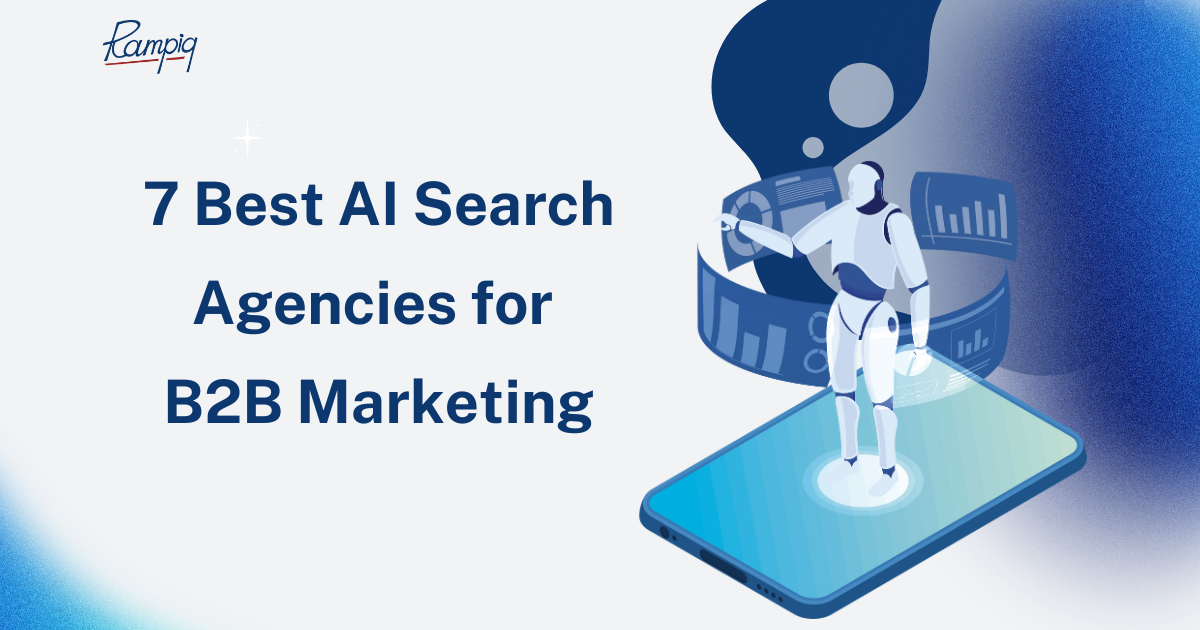What Is Founder-Led Sales and Marketing in B2B?
Founder-led sales and marketing is a business development approach where the founder or founders of a company take an active role in promoting their products or services directly to other businesses. Compared to traditional B2B SaaS marketing team setups, this approach can more efficiently utilize the founders’ expertise and passion to establish credibility, build trust, and differentiate the company in a competitive market.
Founder-led B2B marketing is particularly common in early-stage tech startups, where the founders are deeply involved in product development and intimately familiar with their value proposition. They can effectively communicate the unique benefits of their products or services and tailor their pitch to address specific client needs and pain points.
In addition, founder-led sales in B2B can also help tech companies establish a strong brand identity. It offers a more personalized and authentic way to connect with potential clients and build long-lasting relationships.
Examples of Founder-Led B2B Marketing Activities
Founder-led sales and marketing activities have a hands-on, personalized approach that capitalizes on the founder’s expertise, passion, and vision. And these three features are most commonly used in the following scenarios:
- Pitching Their Startups At Networking Events and Conferences: Founders often attend industry events, conferences, and networking gatherings. These provide valuable opportunities to meet potential clients, partners, and investors, and to showcase the company’s offerings firsthand.
- Building Products “In Public”: Founders often show their progress with their product on social media – for instance, they provide updates on how the team is working on new features or a roadmap. This direct engagement with their audience helps them build credibility and better communicate the value proposition of their product.
- Thought Leadership On Podcasts: Founders can also take active part in podcast production, where they would share their unique business experience and product insights. This way, they position themselves as thought leaders in their industry and attract attention to projects they are involved in.
- Doing Sales Calls and Sharing Insights from Them: Founders can engage in important sales calls to showcase the deep expertise of the team as well as their personal commitment to the client’s success. After that, they can also share some insights and lessons learned from the call, for instanceian effective pitching strategy.
- Strategic Partnerships and Alliances: Founders actively seek out strategic partnerships and alliances with complementary businesses or industry influencers. These collaborations can help expand the company’s reach, access new markets, and generate qualified leads.
- Community Engagement and Events: Lastly, they can engage with their target audience by participating in community events, hosting workshops or meetups, or sponsoring industry-related gatherings. This helps build brand awareness, foster trust, and nurture relationships with potential clients.
Why Should Founders Get Actively Involved in Marketing?
It’s common for tech startup founders to be involved in practically every sphere of the business, so marketing is not special in that regard. At the same time, the degree of their involvement will directly depend on how many of the below reasons are relevant to any specific founder. From our experience, the reasons are as follows:
Passion and Vision
Founders are often driven by a deeply rooted passion for solving a specific problem or fulfilling a need in the market. This passion fuels their relentless pursuit of success and inspires others to join them on their journey. At the same time, their vision is not about just making a profit – it is a desire to make a meaningful impact and leave a lasting legacy in their industry.
Unique Expertise and Authority
Founders typically have a wealth of industry-specific knowledge and experience that sets them apart as thought leaders in their field. This expertise enables them to position themselves as trusted advisors to their target audience – a benefit that many founders look to exploit.
Authenticity and Transparency
Founders have the unique ability to humanize their brand and connect with their audience on a personal level. By sharing their journey, challenges, and triumphs openly and honestly, they can build genuine relationships with customers based on trust and mutual respect.
Startup Resource Constraints
Startups often operate under tight marketing budgets (learn how to manage one in our guide) and limited resources, forcing founders to take on multiple roles to keep the business running smoothly. By taking on the role of chief marketer, founders can leverage their creativity and resourcefulness, and scrappiness to execute cost-effective marketing strategies that deliver maximum impact.
Speed and Agility
Startups operate in a fast-paced environment where adaptability is essential for survival – and founders are typically accustomed to making quick decisions and pivoting rapidly based on market feedback. This nimbleness allows them to experiment with different marketing approaches, iterate on the fly, and course-correct as needed.
Lead Generation and Relationship Building
Founders tend to play a critical role in nurturing long-term relationships with potential clients, investors, and partners. Their extensive networks and industry connections provide valuable opportunities for networking, referrals, and warm introductions.
Inspiring and Motivating the Team
As the visionary leader of the company, founders have a profound impact on the culture and morale of their team. They can lead by example by actively participating in marketing initiatives, and thus motivate their employees to go above and beyond to achieve company goals.
Plan Your Founder-Led GTMa
We’ll use these seven tactics to sketch a lean, founder-led marketing plan for your next 1-2 quarters.
Tips for Founder-Led B2B Marketing Campaigns
In this section, we will highlight some of the key concepts behind successful founder-led marketing. All of them seek to maximize the benefits and the strengths associated with the founder being directly involved, namely:
Leverage Personal Branding
Founders should consistently share valuable insights and experiences related to their niche – utilizing platforms like LinkedIn Pulse to publish long-form articles is one effective way of doing that. You can also host live Q&A sessions or webinars where they can share actionable advice and engage directly with your audience.
Additionally, you can collaborate with other founders or industry influencers on joint content initiatives such as guest blog posts, podcast interviews, or LinkedIn Live sessions.
Share Your Founder Journey
Craft compelling narratives that highlight the challenges, successes, and pivotal moments of your entrepreneurial journey. For that purpose, use a variety of mediums such as blog posts, videos, or social media updates. Incorporate behind-the-scenes glimpses into your daily life, team dynamics, and company culture to humanize your brand and showcase its unique personality.
Engage Your Social Media and Email Community
Regularly share valuable content, industry news, and updates across your social media channels to keep your audience informed and engaged. Cultivate a sense of exclusivity and belonging by offering insider access or special perks to your social media followers and email subscribers. Exclusive discounts, early access to new products or features, or VIP invitations to virtual events can incentivize engagement and foster brand loyalty.
Also make sure to actively participate in relevant social media discussions and address customer inquiries or feedback promptly – this will demonstrate your commitment to the community.
Maximize Website Content Value by Showcasing Your Expertise
You should consider creating a dedicated resource center on your website, which would feature in-depth guides, case studies, whitepapers, and other educational materials relevant to your target audience. Fresh, relevant content will enhance your site’s SEO performance and position you as a trusted advisor by providing valuable insights that address common pain points or challenges.
And for better user experience on your website, organize content into easily navigable categories and implement clear calls-to-action (CTAs) to encourage further engagement or lead capture.
Embrace Thought Leadership Opportunities
Seek out opportunities to contribute guest articles or op-eds to reputable industry publications, blogs, or newsletters. Thought leadership articles allow you to share your expertise with a wider audience while positioning your brand as a trusted authority in your field.
Also make efforts to participate at industry conferences, webinars, or virtual events as an expert speaker – delivering insightful presentations will increase your visibility and reinforce your credibility within the industry.
Forge Strategic Partnerships
Identify complementary businesses or organizations with overlapping target audiences and explore collaboration opportunities. Joint marketing initiatives, co-hosted events, or cross-promotional campaigns can extend your reach and introduce your brand to new potential customers.
On top of that, you can use existing customer relationships to facilitate introductions or referrals to other businesses in your network. Trusted recommendations from satisfied customers carry significant weight and can help you establish credibility and trust with new prospects.
Utilize User-Generated Content
Encourage your customers to share their experiences, success stories, or testimonials through user-generated content (UGC). Whether it’s in the form of reviews, case studies, or social media posts, UGC provides authentic social proof and builds trust with prospective buyers. And make sure to showcase user-generated content prominently on your website, social media channels, and marketing materials.
Marketing Channels in Founder-Led Marketing
This section serves as the logical continuation of the previous one as we look at the main marketing channels founders use to make the most out of their strengths. The list of channels is not dissimilar to what we would find in standard marketing – however, we have added some nuance to each:
Content Marketing
Founders can personally contribute to content creation by sharing their expertise, insights, and unique perspective on industry trends, challenges, and solutions. They can leverage their experience and knowledge to create thought-provoking content that will position their company as a trusted authority in the field.
For higher-quality output, founders can collaborate with their team members to produce a variety of content formats, including blog posts, case studies, podcasts, webinars or other events.
Social Media Marketing
Founders can also actively engage with their audience on social media platforms by sharing updates about their company’s progress, milestones, and achievements. This will showcase their personality and authenticity by sharing behind-the-scenes glimpses of their journey as entrepreneurs. Additionally, founders can use their personal networks and connections to expand the reach of their company’s social media content, encouraging likes, shares, and comments from their contacts.
Email Marketing
They can make the most out of email communications by adding a personal touch to their messages – for instance, sharing relevant anecdotes or insights. They can use their unique position as company leaders to craft compelling email content that highlights their vision and commitment to customer satisfaction.
Provided that they already have authority, founders can also use it to drive engagement, offering exclusive promotions, or invitations to closed events.
Search Engine Optimization (SEO)
Although often unlikely contributors, founders can still partake in SEO efforts by conducting keyword research, identifying relevant topics and keywords related to their industry, and incorporating them into website content and blog posts. They may also monitor industry trends to signal new keyword opportunities should they arise to create timely, relevant content.
Networking and Relationship Building
They tend to actively participate in industry events, conferences, and meetups to network with potential clients, partners, and investors, leveraging their personal brand and reputation.
They can later follow up with contacts after networking events to explore potential collaboration opportunities.
Community Building and Advocacy
Lastly, founders can engage with their company’s community of customers by participating in online forums, discussion groups, and social media communities. They can massively contribute to discussions, addressing customer concerns, and soliciting feedback and suggestions for product improvements or enhancements.
They can also highlight customer success stories, testimonials, and case studies to showcase the impact of their company’s products or services and inspire advocacy among their community members.
Challenges Tech Founders Can Expect in a Marketing Role
From limited expertise to time constraints, founders can massively struggle in a role of a marketer – however, for every challenge, we can propose a number of practical solutions:
Transitioning Skill Sets
Challenge: Tech founders often lack formal marketing training, which can hinder their ability to develop effective marketing strategies and campaigns.
Solution: You should consider pursuing targeted education and training programs focused on marketing fundamentals, such as branding, market research, and digital marketing tactics. You can also leverage online resources, such as industry-specific blogs, webinars, and online courses, to deepen your understanding of marketing best practices and trends.
Understanding the Audience
Challenge: Tech founders may struggle to empathize with their target audience and understand their unique pain points and motivations.
Solution: Conduct thorough market research and customer discovery activities – engage directly with potential customers through interviews, surveys, and focus groups to gain insights into their needs, preferences, and challenges.
Navigating Marketing Strategies
Challenge: With a multitude of marketing channels available, tech founders may find it challenging to determine the most effective strategies.
Solution: Try to adopt a data-driven approach to your marketing – make sure to set clear KPIs to evaluate the performance of different marketing channels and tactics and iterate based on results.
Balancing Time and Resources
Challenge: Tech founders often face competing demands on their time and limited resources, making it difficult to prioritize and execute marketing initiatives effectively.
Solution: You need to identify high-impact activities that deliver the most value and focus your efforts on those areas – and your data should help you understand which ones to choose. Automation tools and technology platforms can also help streamline marketing processes and free up time for other critical tasks.
On top of that, you can outsource non-core marketing functions, such as content creation or social media management to internal team members or external experts like Rampiq.
Staying Updated on Trends
Challenge: Emerging technologies and trends can make it difficult for tech founders to stay informed and adapt their strategies accordingly.
Solution: Attend industry conferences, workshops, and seminars, as well as participating in online forums and communities. Engaging with industry thought leaders and leveraging reputable sources of information, such as industry publications and research reports, can help tech founders stay informed about best practices in marketing.
When Should Founders Hire a Marketing Agency?
Lastly, we will look into the five most critical signs of a founder-led marketing team needing external help. The more signs you will find relevant to your situation, the more you should consider hiring a team of professionals to assist you in your path to success:
Limited Marketing Expertise
Founders often have deep expertise in technology and product development but may lack the necessary marketing knowledge. In contrast, a specialized marketing agency can provide access to experienced professionals who excel in various aspects of marketing (SEO, PPC, SMM).
Capacity Constraints
It’s common for founders to multi-task heavily in early-stage startups, leading to time constraints and divided focus across different areas of the business. Engaging an agency allows them to delegate marketing responsibilities to a dedicated team, freeing up their time to focus on core business activities, such as product innovation, fundraising, and building strategic partnerships.
Strategic Guidance and Direction
You may struggle with a cohesive marketing strategy, whereas agencies can provide strategic guidance and direction, including unique value propositions, target markets, and compelling messaging. This is usually achieved through collaborative workshops and consultations, after which agencies develop a roadmap for achieving their objectives and driving sustainable growth over time.
Access to Industry Insights and Trends
If keeping up with evolving industry trends and customer preferences proves increasingly challenging, that may be another sign of needing external help. Marketing agencies can monitor market trends, competitor activities, and customer behavior, so that tech companies can anticipate market shifts and pivot their efforts accordingly.
Scaling Marketing Efforts
As startups grow and expand, you can find it difficult to scale their marketing efforts in tandem with increasing demand and competition. By partnering with an agency, founders can access a flexible pool of resources that can adapt to said changes – expanding into new markets or optimizing existing channels for better performance are handled by real experts.







